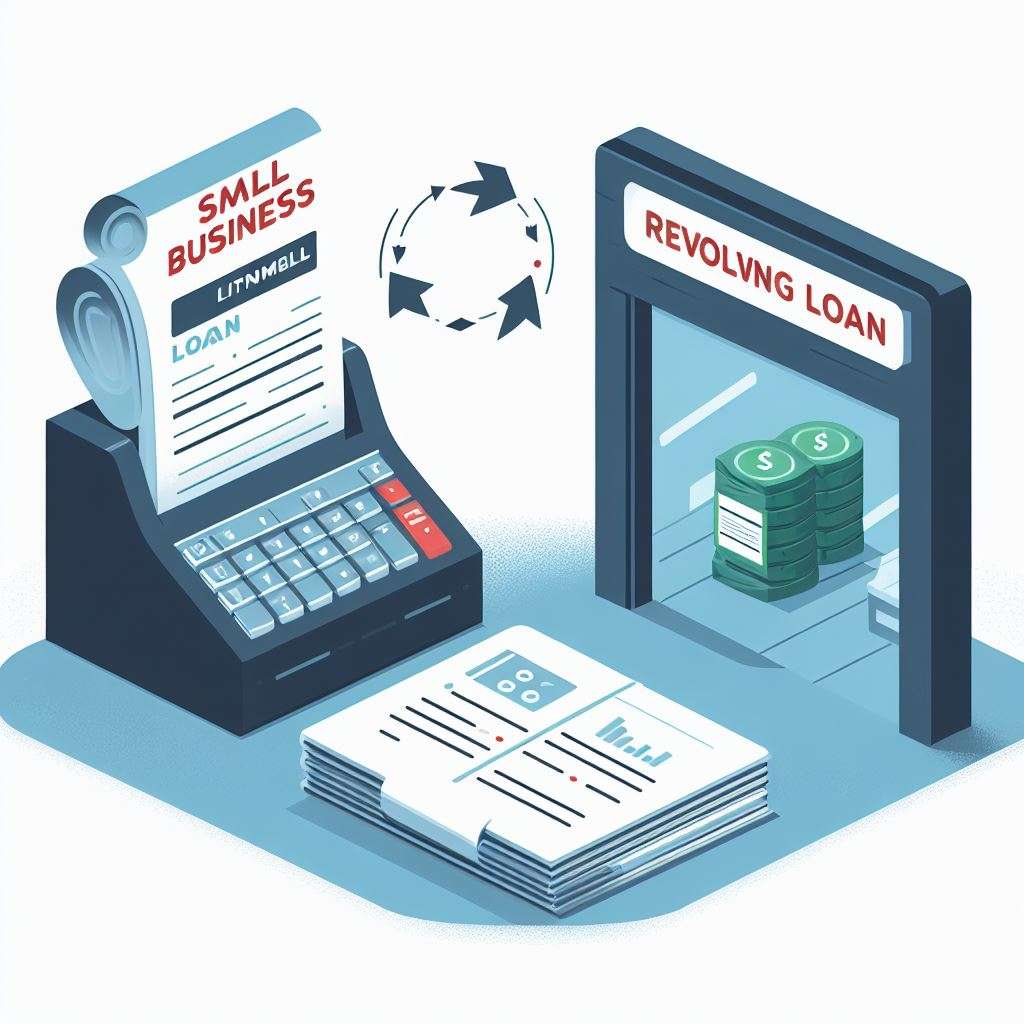Small Business Loan are the backbone of the economy, and they often need financial assistance to grow and expand. One of the most common ways for small businesses to obtain funding is through loans. However, there are different types of loans that businesses can apply for, and it is important to understand the differences between them to make an informed decision. One of the most common questions that small business owners have is whether a small business loan is installment or revolving.

An installment loan is a loan that is repaid through a series of regular payments over a set period of time. Each payment consists of a portion of the principal amount borrowed plus interest. A revolving loan, on the other hand, is a loan that allows the borrower to borrow up to a certain amount, repay the debt, and then borrow again. The borrower is only required to make payments on the amount borrowed, not the entire credit line.
Key Takeaways
- Small business loans can be either installment or revolving.
- Installment loans are repaid through a series of regular payments over a set period of time.
- Revolving loans allow the borrower to borrow up to a certain amount, repay the debt, and then borrow again.
Understanding Small Business Loans

Definition of Small Business Loans
Small business loans are financial products designed to provide funding to small businesses. These loans can be used for a variety of purposes, including purchasing inventory, expanding operations, or covering short-term cash flow needs. Small business loans are typically offered by banks, credit unions, and other financial institutions.
Types of Small Business Loans
There are several types of small business loans available to entrepreneurs. Each type of loan has its own unique features and benefits. The most common types of small business loans include:
- Installment Loans: Installment loans are loans that are repaid in fixed monthly payments over a set period of time. These loans are ideal for businesses that need a lump sum of cash for a specific project or purchase.
- Revolving Lines of Credit: Revolving lines of credit are loans that provide businesses with access to a set amount of credit that can be used as needed. These loans are ideal for businesses that need ongoing access to cash for day-to-day operations.
- Equipment Loans: Equipment loans are loans that are used to purchase equipment or machinery for a business. These loans are ideal for businesses that need to upgrade or replace existing equipment.
- Microloans: Microloans are small loans that are typically offered by non-profit organizations or government agencies. These loans are ideal for businesses that need a small amount of funding to get started or to cover short-term cash flow needs.
Overall, small business loans can be a valuable tool for entrepreneurs looking to grow and expand their businesses. By understanding the different types of small business loans available, entrepreneurs can choose the loan that best fits their needs and helps them achieve their business goals.
Installment Loans

Small business installment loans are a type of financing that provides a lump sum of money upfront, which is then repaid over a fixed period in regular installments. Installment loans are usually offered by banks, credit unions, and online lenders.
Definition of Installment Loans
An installment loan is a loan that is repaid in equal installments over a set period. The borrower receives a lump sum of money upfront and then repays the loan in fixed installments, usually monthly. Installment loans have a fixed interest rate, which means that the borrower knows exactly how much they will pay in interest over the life of the loan.
Benefits of Installment Loans
One of the main benefits of installment loans is that they provide predictable payments. Since the payments are fixed, it is easier for the borrower to budget and plan for the future. Additionally, installment loans usually have lower interest rates than credit cards, making them a more affordable option for financing.
Another benefit of installment loans is that they can help build credit. If the borrower makes regular, on-time payments, their credit score will improve over time. This can make it easier to qualify for future loans and credit cards with better terms and rates.
Drawbacks of Installment Loans
One of the drawbacks of installment loans is that they can be harder to qualify for than other types of financing. Lenders typically require a good credit score and a stable income to qualify for an installment loan. Additionally, the application process can be more time-consuming than other types of financing.
Another drawback of installment loans is that they can be inflexible. Once the loan is disbursed, the borrower cannot usually borrow additional funds unless they apply for a new loan. This can be a disadvantage if the borrower has unexpected expenses or needs additional funds for their business.
In summary, installment loans are a type of financing that provides a lump sum of money upfront and is repaid in fixed installments over a set period. They can be a good option for small business owners who need predictable payments and want to build their credit. However, they can be harder to qualify for and inflexible compared to other types of financing.
Revolving Loans

Revolving loans are a type of credit agreement that allows borrowers to use loan money as needed up to a preset limit they are approved to borrow. The borrower then repays the lender a portion of the balance at regular intervals. Each payment is based on the current balance, interest charges, and applicable fees.
Definition of Revolving Loans
Revolving loans are a type of loan that allows borrowers to draw down and repay funds repeatedly. These loans are ideal for businesses that require ongoing access to funds, such as those with fluctuating cash flows or those needing to cover unexpected expenses.
Revolving loans are similar to credit cards in that they allow borrowers to borrow funds as needed, up to a predetermined limit. However, revolving loans typically have lower interest rates than credit cards, making them a more affordable option for businesses that need to borrow funds over an extended period.
Benefits of Revolving Loans
One of the primary benefits of revolving loans is that they offer businesses ongoing access to funds. This means that businesses can borrow money as needed, rather than having to apply for a new loan every time they require additional funds.
Revolving loans also offer businesses greater flexibility than traditional loans. With a revolving loan, businesses can borrow funds as needed, up to a predetermined limit. This means that businesses can access funds quickly and easily, without having to go through the lengthy loan application process.
Drawbacks of Revolving Loans
One of the main drawbacks of revolving loans is that they can be more expensive than traditional loans. This is because revolving loans typically have higher interest rates than traditional loans, as lenders need to account for the increased risk of lending money without a fixed repayment schedule.
Another potential drawback of revolving loans is that they can be more difficult to manage than traditional loans. This is because businesses need to keep track of their outstanding balance and make sure they are making payments on time to avoid late fees and penalties.
Comparison Between Installment and Revolving Loans

Interest Rates
When it comes to interest rates, installment loans tend to have fixed interest rates while revolving loans have variable interest rates. Fixed interest rates remain the same throughout the loan term, while variable interest rates can fluctuate with market conditions. This means that with an installment loan, borrowers can budget for a fixed payment amount each month, while with a revolving loan, borrowers may experience changes in their monthly payments.
Repayment Terms
Installment loans have a set repayment schedule, with borrowers making regular payments over a fixed period of time. This can range from a few months to several years, depending on the loan amount and terms. Revolving loans, on the other hand, have no set repayment schedule and allow borrowers to make payments as they see fit. However, revolving loans typically have a minimum monthly payment requirement.
Flexibility
Revolving loans offer more flexibility than installment loans. With a revolving loan, borrowers can borrow money, pay it back, and then borrow again without having to reapply for a new loan. This can be useful for businesses that have ongoing expenses or need access to funds on a regular basis. Installment loans, on the other hand, provide a lump sum of money upfront, which must be repaid over a fixed period of time.
Impact on Credit Score
Both installment and revolving loans can impact a borrower’s credit score. Making on-time payments on an installment loan can help improve a borrower’s credit score while missing payments can have a negative impact. Revolving loans can also impact a borrower’s credit score, but the impact can vary depending on factors such as credit utilization and payment history.
Overall, the choice between an installment loan and a revolving loan will depend on a business’s specific needs and financial situation. Borrowers should carefully consider the interest rates, repayment terms, flexibility, and impact on credit score before making a decision.
Choosing the Right Loan for Your Business

When it comes to choosing the right loan for your small business, it’s important to assess your needs, consider your financial situation, and understand lender requirements. Here are some factors to consider:
Assessing Your Business Needs
Before applying for a loan, it’s important to assess your business needs. Determine how much money you need, what the funds will be used for, and how long you will need to pay back the loan. This will help you determine whether an installment loan or revolving credit is the best option for your business.
Considering Your Financial Situation
Your financial situation will also play a role in determining the type of loan that’s right for your business. If you have a strong credit score and a solid financial history, you may be able to qualify for a revolving line of credit. On the other hand, if you have less-than-perfect credit or a limited financial history, an installment loan may be a better option.
Understanding Lender Requirements
It’s important to understand the requirements of different lenders before applying for a loan. Some lenders may require collateral or a personal guarantee, while others may have minimum revenue or credit score requirements. It’s important to do your research and find a lender that meets your specific needs.
In summary, choosing the right loan for your business requires careful consideration of your business needs, financial situation, and lender requirements. By taking the time to assess these factors, you can make an informed decision that will help your business thrive. Learn More
Frequently Asked Questions

Are small business loans typically installment or revolving?
Small business loans can be either installment or revolving credit. The type of loan depends on the lending agreement and the borrower’s needs. Installment loans are repaid in fixed monthly payments, while revolving credit allows borrowers to access a line of credit and make payments on the balance as needed.
Is collateral required for small business loans?
Collateral is not always required for small business loans, but it can be a factor in securing a loan. Collateral is an asset that the borrower pledges to the lender as security for the loan. If the borrower defaults on the loan, the lender can seize the collateral to recoup their losses.
What is the difference between installment and revolving loans?
Installment loans are repaid in fixed monthly payments, while revolving loans allow borrowers to access a line of credit and make payments on the balance as needed. Installment loans have a set repayment period, while revolving loans can be used repeatedly as long as the borrower makes payments on time.
Are small business loans typically fixed or variable?
Small business loans can be either fixed or variable. Fixed-rate loans have a set interest rate that does not change over the life of the loan. Variable-rate loans have an interest rate that can fluctuate based on market conditions.
Can lenders require a down payment for small business loans?
Lenders may require a down payment for small business loans, especially for larger loans. A down payment is a percentage of the loan amount that the borrower pays upfront. This reduces the lender’s risk and shows the borrower’s commitment to repaying the loan.
Are personal loans and small business loans the same type of loan?
Personal loans and small business loans are not the same type of loan. Personal loans are used for personal expenses, while small business loans are used for business expenses. Small business loans may require additional documentation and have different eligibility requirements than personal loans.
Read More Articles in theformalstudiess

